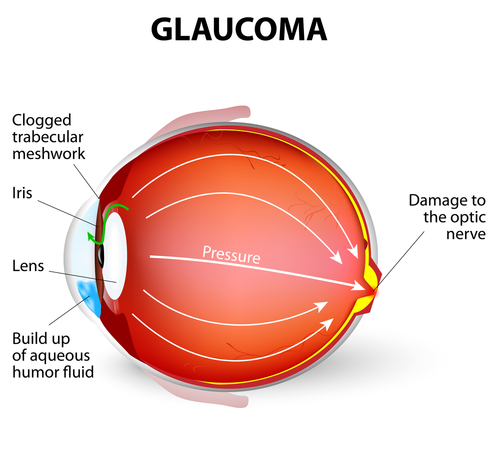What is Glaucoma, and is it Serious?
September 14, 2023
Nearly everyone has heard of glaucoma, but how much do you know about the eye condition? Glaucoma affects almost one in every 50 adults, and it is well worth it to take a few moments to understand this relatively prevalent condition.
Due to its slow progression, glaucoma has earned the name "the silent bandit of vision." Thankfully, vision loss is less likely to sneak up on you due to modern advancements and awareness.
Keep reading to learn more about glaucoma and determine if it's a serious eye condition.
What is Glaucoma?
 Glaucoma is an eye condition that involves the optic nerve. The optic nerve is a bundle of over one million nerve fibers at the back of the eye.
Glaucoma is an eye condition that involves the optic nerve. The optic nerve is a bundle of over one million nerve fibers at the back of the eye.
These nerve fibers transmit information from the eye to the brain, allowing you to perceive and see the world. In most cases, glaucoma occurs because of eye pressure.
Eye pressure, also known as intraocular pressure, or IOP, is often too high, leading to the development of glaucoma. The fluids in your eye constantly exert pressure that helps the eye maintain its shape and other essential functions, like supplying nutrients and keeping the eye clean.
With glaucoma, eye pressure is typically elevated, exceeding normal levels. Having elevated intraocular pressure can occur for a number of reasons.
Glaucoma most often occurs in people who are 40 and older. This is due to age-related eye changes that can impact intraocular pressure.
Other risk factors for glaucoma include:
- Having a family history of glaucoma
- Being of African, Hispanic, or Asian descent
- Having any previous eye injuries
- Extended use of steroid medications
- Certain conditions, such as diabetes and high blood pressure
Are There Different Types of Glaucoma?
Glaucoma is technically not a single condition but a group of eye conditions. Although there are several kinds of glaucoma, the two primary types are open-angle and angle-closure glaucoma.
Open-angle glaucoma is the more common of the two. Angle-closure glaucoma is relatively rare.
With open-angle glaucoma, there is an issue with the outward flow of fluid from the eye. The flow of fluid in the eye requires continuous maintenance to keep pressure within a healthy range.
Fluid drains from the eye via the trabecular meshwork, a network of channels. For patients with open-angle glaucoma, the structures of the eye remain intact, but the fluid fails to drain out as it should.
Open-angle glaucoma develops gradually over time. The rate of progression varies from person to person, but it can be years or decades before it begins to impact your vision.
Angle-closure glaucoma, on the other hand, comes on suddenly and develops fast. In this case, a sudden build-up of pressure within the eye exists.
The sudden build-up of pressure in the eye can happen for several reasons. The drainage channel between the iris and cornea may become too narrow.
An enlarged pupil may also block the drainage pathway.
Signs of Glaucoma
 The symptoms of glaucoma vary, depending on the type. With open-angle glaucoma, which is far more common, progression is gradual.
The symptoms of glaucoma vary, depending on the type. With open-angle glaucoma, which is far more common, progression is gradual.
A patient may not experience any symptoms in the early stages. However, when it develops to the point that it affects their vision, patients often first notice blind spots in their peripheral vision.
Eventually, the central vision will be affected, making it more challenging to recognize faces, read books, or see details.
Angle-closure glaucoma involves its own set of symptoms. Symptoms can occur rapidly and include:
- Blurry vision
- Intense headache
- Intense eye pain
- Nausea and vomiting
- Abdominal pain
- Halos around lights
- Eye redness
One of the most important aspects to understand about glaucoma is that, while it can occur suddenly, it is far more likely to develop gradually over time, with few signs of it in the early stages. Most patients with glaucoma don't realize they have it until they have experienced irreversible, permanent vision loss.
How Serious Is Glaucoma?
As the leading cause of blindness, glaucoma is a serious eye condition. If left untreated, it can lead to permanent vision loss.
Unfortunately, any damage to the optic nerve is not reversible. Total vision loss can occur if you have glaucoma.
For this reason, regular eye exams are crucial. Eye exams are your best defense against eye conditions like glaucoma.
They also allow your eye doctor at Metropolitan Ophthalmology to evaluate you for early warning signs of glaucoma that may otherwise go unnoticed. During your exam, your ophthalmologist will check your eye pressure. The earlier glaucoma can be diagnosed and treated, the better the chances of preserving your sight and ability to see.
While glaucoma is a serious condition, it does not have to progress to the point where it seriously impacts your vision. A variety of effective treatments can help prevent the condition from worsening.
As one of the only glaucoma specialists in the Northern Virginia region, Dr. Park has helped many patients treat their glaucoma and save their vision. Her fellowship in glaucoma at the Emory Eye Center and membership in the American Glaucoma Society make her an expert in diagnosing and treating this condition, using the latest surgical techniques to deliver the best possible outcome.
When was the last time you had your eyes checked for glaucoma? Take the first step to prioritizing your eyes by requesting an appointment at Metropolitan Ophthalmology in McLean, VA, today!
You only get one set of eyes, so why not finally treat them with the respect they deserve?



